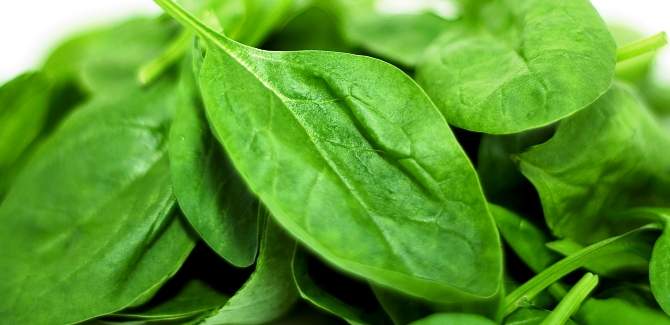We all know the popular cartoon character Popeye and his love for spinach. Why did he love this green leaf so much? Spinach is a low calorie super food that is nutritionally rich and helps you improve your health. Scientists claim that eating a bowl of spinach can enhance the strength of your muscles as well as boost your energy. Spinach is native to the Middle East, and it was grown in Persia several thousands of years ago. Gradually it made its way into Europe and other parts of the world. It can be eaten raw or in the cooked form as well. The overabundance of health benefitting nutrients makes this vegetable an integral part of a healthy and well balanced diet.
Nutritional value of spinach
Leafy vegetables like spinach are packed with protein, vitamins and minerals that are important for your bones, skin, hair, and overall health. Spinach leaves contain a good amount of dietary fiber. A cup of raw spinach can provide about 27 calories. It is low in cholesterol and saturated fat, and serves as a great source of minerals like potassium, iron, calcium, copper, phosphorus, zinc, manganese and magnesium. Eating spinach can supply your body with a wide range of vitamins such as vitamin A, vitamin C, vitamin E, vitamin K, thiamin, niacin, riboflavin, vitamin B6 and folate. Spinach also contains many phytonutrients such as lutein, zea-xanthin and beta-carotene that promote better health and prevention from many diseases.
Health benefits of spinach
The regular consumption of spinach comes with many health benefits, some of which include lowering blood pressure, managing blood glucose levels, improving bone health, and lowering the risk of cancer. Given below are the most important health benefits offered by this wonderful green vegetable:
Antioxidant benefits of spinach
Spinach is a store house of many carotenoid and flavonoid compounds that possess strong antioxidant and anti-inflammatory properties. Moreover, this vegetable is an excellent source of other antioxidants such as vitamin C, vitamin E, vitamin A, manganese zinc and selenium, all of which help in preventing oxidative stress caused by free radicals, thus lowering the risk of numerous associated health problems. The consumption of spinach provides you with antioxidant carotenoids like lutein and zeaxanthin that may prevent eye problems, including age-related macular degeneration.
Spinach is the best anti-aging food
The various antioxidants in spinach make it a super anti-aging food. It contains nutrients like zinc, vitamin A and vitamin C, all of which have potential anti-aging properties. The high concentration of vitamin C in this leafy vegetable helps protects your skin from damages that can be caused by free radicals. It helps in increasing the production of collagen, which in turn makes your skin more elastic supple and youthful. Vitamin C also promotes faster healing of wounds and infections. All these antioxidants in spinach helps in preventing premature aging and in reducing the appearance of fine lines, wrinkles, dark spots and other signs of early aging.
Spinach is an ideal food for diabetics
Since spinach has only a negligible effect on blood sugar, it is considered an ideal food to be included in a diabetic diet. Spinach is rich in an antioxidant known as alpha-lipoic acid, which has been found to be effective in lowering blood glucose levels and increasing insulin sensitivity in people suffering from diabetes. It also helps in preventing oxidative stress-induced changes in these patients. According to studies, this antioxidant is beneficial in reducing in autonomic neuropathy and peripheral neuropathy in diabetic patients.
[Read more about natural food for diabetes]
Spinach lowers blood pressure
Spinach has high potassium content and because of this, it is often recommended to individuals with hypertension or high blood pressure. Potassium lowers blood pressure by negating the effects of sodium in the body. Spinach is rich in nitrates, which according to studies may keep your blood vessels healthy and lower blood pressure. Researchers have found that many peptides (small pieces of protein) found in spinach also helps in lowering blood pressure by inhibiting an enzyme known as angiotensin I-converting enzyme.
Spinach improves your bone health
The high levels of vitamin K found in spinach improves calcium absorption, functions as a modifier of bone matrix proteins, prevents excessive activation of osteoclasts (the cells that cause the breakdown of bone ) and also reduces the excretion of calcium through the urine. A deficiency of this vitamin is often associated with increased risk of bone fractures. Spinach is also a great source of other bone benefitting nutrients such as calcium, magnesium and phosphorus.
[Read more natural foods to make your kid grow taller]
Spinach helps in losing weight
Spinach is a very effective weight loss food as it is low in calories and helps in reducing food cravings significantly. According to researchers, an extract of spinach that contains green leaf membranes known as thylakoids have the ability to curb hunger pangs by 95% and reduce weight by 43%. The study reveals that thylakoids enhances the production of satiety hormones by the body and suppresses food cravings, which in turn promotes better appetite control, healthier food habits and weight loss.
Spinach promotes digestive health
Spinach contains a high amount of dietary fiber that is good for the digestive system. It contains lutein, which is absorbed by your intestine and broken down during the digestive process. Lutein is an antioxidant that protects your body from free radical damage. The fiber in spinach promotes regularity and prevents digestive problems like constipation. Spinach also contains nutrients known as glycoclycerolipids that can protect the lining of the digestive tract from damage.
Spinach and cardiovascular health
Spinach contains all the nutrients that your heart needs to function at its optimum best. It is rich in plenty of antioxidants, fiber, omega-3 fatty acids, and B vitamins. The high amounts of folate in these leaves is very essential for developing and maintaining healthy cells, like the red blood cells which are required for heart health. Spinach is a great food that lowers cholesterol and high blood pressure. It contains lutein, an antioxidant that protects the arteries from clogging. Studies reveal that spinach helps people survive a heart attack. The nitrite in this leaf converts into nitric oxide when the oxygen levels fall during a heart attack. Nitric oxide widens the clogged arteries, helping to increase the oxygen supply to the heart.
Spinach has anti-cancer and anti-inflammatory properties
Studies reveal that there more than a dozen flavonoid compounds in spinach that possess anti-inflammatory and anti-cancer effects. In fact, spinach extracts have been created to study its anti-cancer effects in laboratories. These extracts have been found to inhibit the process of cell division in human stomach cancer cells and to reduce skin cancers in laboratory animals. Medical studies also show that the consumption of spinach can potentially decrease the risks of breast cancer in women. The flavonoids and carotenoids found in spinach have been found to play a major role in reducing inflammation.
Spinach benefits your eyes
Lutein and zeaxanthin are antioxidant pigments which help in maintaining the health of the eyes. Spinach happens to be a great source of these pigments. Studies reveal that the consumption of foods rich in lutein and zeaxanthin can help in increasing the pigment density in the macula, which in turn lowers the risk of macular degeneration and cataract.
[Read more about natural way to get rid of under eye wrinkles]
Spinach improves your immune system
Spinach is full of nutrients and antioxidants that improve the production of white blood cells. It is loaded with vitamin C, which is known to boost your immunity and ward off infections.
Spinach prevents anemia
The high iron content in spinach increases the production of red blood cells. It regenerates the red blood cells, allowing for improved supply of oxygen to all parts of the body. The regular intake of this leafy vegetable can thus help in preventing iron deficient anemia.
Spinach boosts brain power
Studies show that eating a diet comprising of spinach can keep your brain healthy and alert even in old age. The antioxidants in this vegetable protect the brain from the free radical damage, which is often linked to mental decline in old age and diseases like Alzheimer’s and Parkinson’s diseases. Studies conducted in rats show that a diet rich in spinach helps improve memory and learning capabilities. Spinach is a rich source of lutein, beta-carotene and folate, which have been associated with preventing dementia. L-tyrosine, an amino acid found in spinach keeps your brain alert and focused.
Eating spinach strengthens muscles

According to research, the nitrates present in spinach can help in building stronger muscles. The nitrates act on two proteins that are associated with the regulation of calcium in human beings. More calcium is released as the level of these proteins increases, which leads to increased muscle contraction.
Selection and storage of spinach
When you purchase spinach, look for fresh ones that are medium to dark green in color and do not show any signs of decay. After purchasing, store the leaves in sealed plastic bags in the refrigerator. This way it will keep for about four to five days. Make sure not to wash spinach before storing, because the moisture content leads to decay of the leaves. However you should wash them thoroughly before consumption to get rid of the soil, dirt and chemicals. The best ways to cook spinach is to steam or sauté them as boiling the leaves can reduce its nutrient content.
Spinach is an amazing green leafy vegetable that is a powerhouse of nutrients and antioxidants. It is loaded with many essentials nutrients that benefit all parts of your body. This healthy vegetable is one of the favorite ingredients used by many chefs all around the world. Because of the wide range of health benefits this vegetable offers, it is recommended to consume spinach on a regular basis.
[image-credits]

